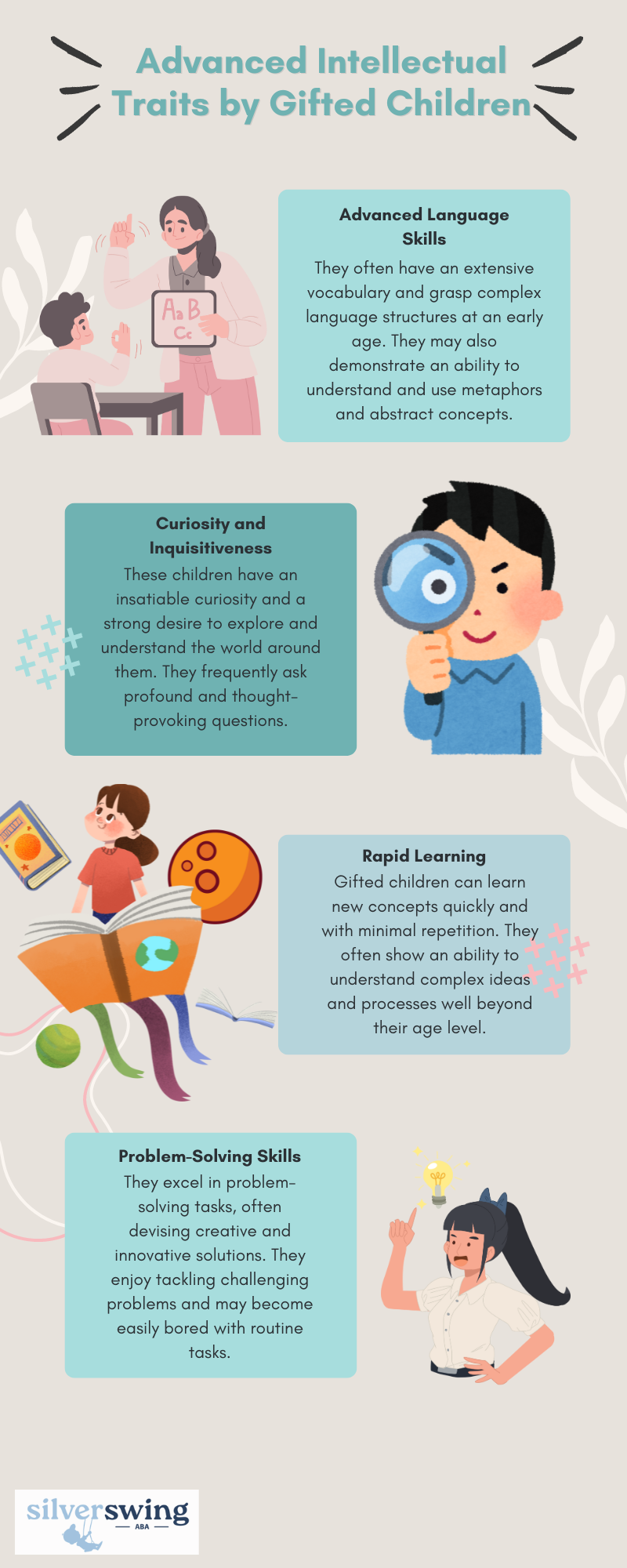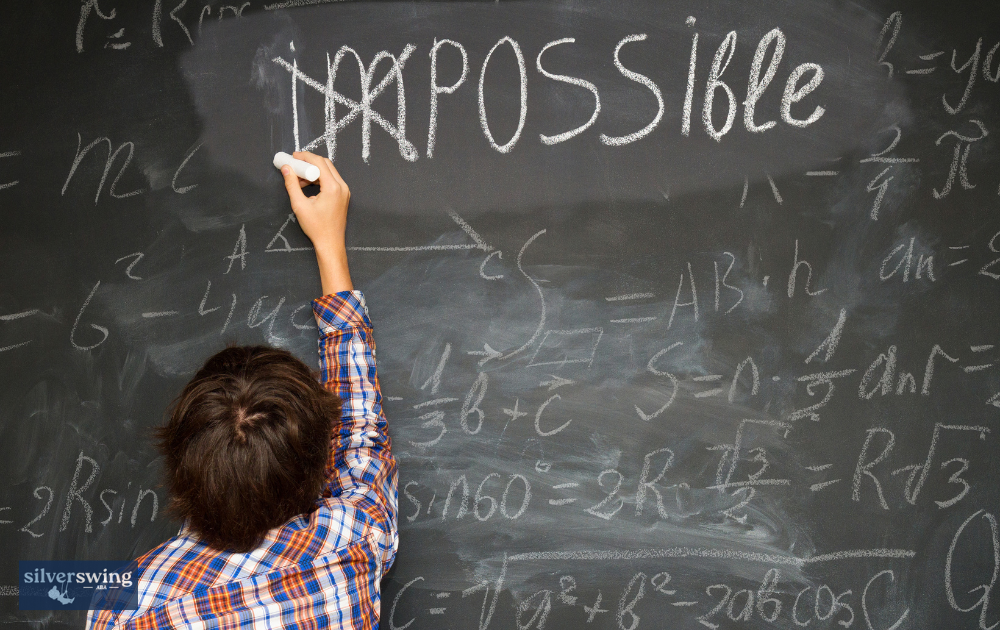Identifying gifted children can be a complex process that requires careful observation and consideration of their behavior and characteristics. This is even more true on autistic children due to the unique changes in their brains.
One of the primary methods used to identify gifted children is through simple observation of their behavior. Educational professionals, parents, or friends may notice specific traits and behaviors that indicate giftedness.
This method allows for accurate detection of different types of giftedness and is less intrusive compared to other methods.
That said, this article will go over a checklist of traits and behaviors that gifted children tend to possess. Let’s get started.

Traits of Gifted Children
Understanding the traits and behaviors commonly associated with gifted children can help parents and caregivers identify and support their unique needs.
Giftedness is not solely determined by academic achievements. It’s also a combination of intellectual, academic, and social-emotional characteristics that set these individuals apart from their neurotypical peers.
Here, we’ll explore the various behaviors and traits often observed in gifted children.

Academic Behavior
Gifted children may exhibit academic behaviors that differ from what is typically expected in a classroom setting.
While some may excel academically, others may display behaviors that seem counterproductive, such as daydreaming or difficulty controlling their tempers.
It’s important to remember that giftedness is a brain-based difference, and these behaviors can stem from their unique intellectual and learning styles.
Highly gifted children, in particular, may not always stand out based on their achievements. They may even appear average or below average in school despite their exceptional intellectual capabilities.
This discrepancy can create challenges when advocating for the needs of highly gifted children and emphasizes the importance of recognizing and supporting their specific educational requirements.
Quirky Characteristics
Gifted children often exhibit quirky characteristics that set them apart from their peers. These behaviors can be key indicators of giftedness, extending beyond academic performance.
Some common quirky characteristics include:
- Quirky Sense of Humor – Gifted children may have a unique and often sophisticated sense of humor, finding amusement in unusual or unexpected situations.
- Intense Questioning – Gifted individuals are known for their curiosity and may engage in relentless questioning to further their understanding of the world around them.
- Restlessness and Preference for Complex Topics – Gifted children may resist sitting still in the classroom and may seek out discussions on complex subjects that captivate their intellectual curiosity, such as philosophical concepts or scientific theories.
These quirky characteristics can help identify gifted children, providing valuable insights into their cognitive and emotional development.
Emotional Intensities
Emotional intensities are commonly observed in gifted children. These individuals may experience heightened emotional responses compared to their neurotypical peers. The following emotional characteristics are frequently associated with giftedness:
- Frustration and Anger – Gifted children may become easily frustrated or angry, particularly when they feel their needs or interests are not being met. This frustration can stem from a sense of being pulled away from activities or subjects that deeply engage their intellectual curiosity.
- Emotional Sensitivity – Gifted children often exhibit extreme sensitivity, both emotionally and physically. They may have intense reactions to stimuli such as witnessing the suffering of others, encountering unfair expectations, or experiencing harsh emotional situations. It’s important to note that this sensitivity does not indicate a mental or physical disability but is a natural part of their emotional makeup.
Intellectual Traits
Gifted children often exhibit advanced intellectual abilities. Some of the key indicators include the following:

Social and Emotional Traits
The social and emotional characteristics of gifted children can vary widely but often include the following:
- Sensitivity and Empathy – Gifted children are often highly sensitive and empathetic. They may show a deep concern for the feelings of others and a strong sense of justice and fairness.
- Advanced Moral Reasoning – They frequently exhibit advanced moral reasoning and a keen sense of right and wrong. They may engage in discussions about ethical issues and express strong convictions.
- Leadership Abilities – Many gifted children demonstrate natural leadership qualities. They can motivate and inspire their peers, often taking on leadership roles in group activities.
- Intense Emotions – These children may experience emotions more intensely than their peers. They can be highly passionate and driven but may also be more prone to stress and anxiety.
Understanding and addressing the emotional intensities in gifted children is essential for their overall well-being and success in both academic and social settings.

Challenges Faced by Gifted Children
Despite their exceptional abilities, gifted children often face unique challenges that can impact their academic, social, and emotional well-being. Understanding these challenges is essential for parents, caregivers, and educators to provide appropriate support and guidance.
Here are some of the common challenges they face:
Academic Underachievement
Contrary to expectations, highly gifted children may not always stand out based on their achievements and may even appear average or below average in school. This discrepancy between their potential and performance can create tension when advocating for their needs.
Factors such as boredom, a lack of a challenging curriculum, coexisting learning disabilities, or social and emotional issues can contribute to academic underachievement.
It’s important to recognize that underachievement in gifted students is rarely due to poor work ethic or laziness.
Social Struggles
Gifted students often struggle socially due to their above-average intelligence, emotional intensities, and complex interests.
These characteristics can make them stand out among their peers, leading to feelings of being different or not fitting in. The asynchronous development of gifted children, where their intellectual abilities may be advanced while their social and emotional development is more aligned with their age group, can further exacerbate social challenges.
It is crucial to provide opportunities for gifted children to connect with like-minded peers and create a supportive environment to foster social growth.
Emotional Sensitivities
Gifted children can exhibit extreme sensitivity, both emotionally and physically. They may be deeply affected by various stimuli, such as witnessing the suffering of others, perceiving unfair expectations, or experiencing intense emotional situations.
It is important to note that this sensitivity does not indicate a mental or physical disability. Understanding and validating their emotions, providing outlets for expression, and teaching coping strategies can help gifted children navigate their emotional sensitivities effectively.
To address these challenges, it is crucial for parents, caregivers, and educators to collaborate and create an individualized approach that recognizes the unique needs of gifted children.
By providing appropriate academic opportunities, fostering social connections, and supporting emotional well-being, we can help gifted children thrive and reach their full potential.
Sources:
https://www.svvsd.org/departments/student-services/characteristics-checklist-for-gifted-children
https://www.verywellfamily.com/quick-test-for-giftedness-1449134
https://www.davidsongifted.org/prospective-families/gifted-traits-and-characteristics
https://crushingtallpoppies.com/2014/06/09/a-gifted-child-checklist-for-teachers




